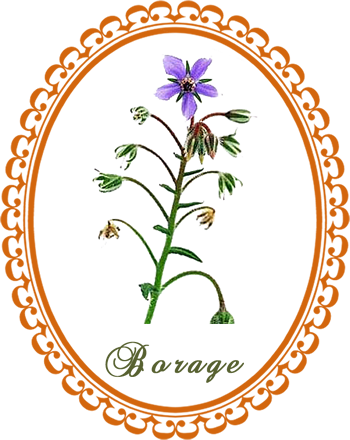
Borage: benefits the adrenal glands, helping to restore function after the use of steroids. Also helps boost the immune system ...
Common Names: Borage, Bugloss, Starflower
Botanical Name: Borago officinalis
Family: Boraginaceae
Plant Type: Hardy annual
Parts Used: Leaves, flowers, stems, seeds
Flowering: Repeatedly from Spring thru to Autumn
Borage, also known as a starflower, is an annual herb originating in Syria, but naturalized throughout the Mediterranean region, as well as Asia Minor, Europe, North Africa, and South America.
Description: Borage grows to a height of 2 - 3 ft, and is bristly or hairy all over the stems and leaves; the leaves are alternate, simple, and 2–6 in long. The flowers are complete, perfect with five narrow, triangular-pointed petals. Flowers are most often blue in color, although pink flowers are sometime observed. White flowered types are also cultivated. The flowers arise along scorpiod cymes to form large floral displays with multiple flowers blooming simultaneously. It has an indeterminate growth habit which may lead to prolific spreading. In milder climates, borage will bloom continuously for most of the year.
Cultivation: Borage grows in rich, moist, light soil; it prefers full sun and a pH of 6.6.
Harvesting: Collect the leaves before the flowers come out, the flowers when in first bloom and the seeds when they are ripe. Use herb parts fresh or dry. Store for up to one year - their potency diminishes over time.
Culinary Uses: Borage's cucumber-flavored leaves are used raw in salads or cooked like spinach. Eat the stems like celery. Candy the leaves and serve as dessert or as a garnish.
Borage Magick
Courage. Psychic Powers.
Gender: Masculine
Planet: Jupiter
Element: Air
Carry fresh borage flowers to boost your courage.
Drink a cup of borage tea to develop or enhance your psychic abilities.
Place borage flowers on your altar to deepen your connection with spirit.
Sprinkle a handful of the dried herb around the outside of your home for protection.
Place fresh borage flowers on the table before you read Tarot cards to improve the accuracy of the reading.
Herbal Healing with Borage
Medicinal Actions: Anti-inflammatory, diaphoretic, expectorant, galactagogue, emollient, diuretic, tonic
Medicinal Uses: Borage helps treat depression. It relieves fevers, bronchitis, and diarrhea. It's an adrenal tonic, an anti-inflammatory, and stimulates milk flow in nursing mothers. Its seeds are a rich source of oil containing gamma-linolenic acid, or G.L.A. which is also found in evening primrose seed. Remarketed as starflower oil, this has potent anti-inflammatory and tonic effects. It is particularly useful in the treatment of eczema, arthritis, menstrual problems, and adverse symptoms of menopause.
Contraindications (Borage Seed Oil):
- During pregnancy or breastfeeding
- Epileptics, those taking epileptogenic or neuroleptic drugs
- Hemophiliacs and those taking anticoagulant drugs such as warfarin should consult their doctor before taking borage oil
- Stop use if undergoing any surgical procedure
Body Care with Borage
To relieve the mind during times of stress, depression and insomnia, take 1 cup borage infusion up to three times daily, as needed
To ease a dry cough, or relieve a cold, fever or other signs of respiratory congestion, take 1 - 2 teaspoons borage cough syrup three times daily until the symptoms have passed.
Infusion: 1 teaspoon dried or 2 teaspoons fresh borage in 1 cup just-boiled water.
Cough syrup: make 2 cups borage infusion and mix with 2 - 4 teaspoons honey or raw sugar until the mixture turns syrupy. Keeps in the refrigerator for up to one week.
Source: The Essential Herbs Handbook by Lesley Bremness
If you appreciate the information provided,
please help keep this website running. Blessings!
© 2008-2025 aromaworx.ca. All rights reserved.

